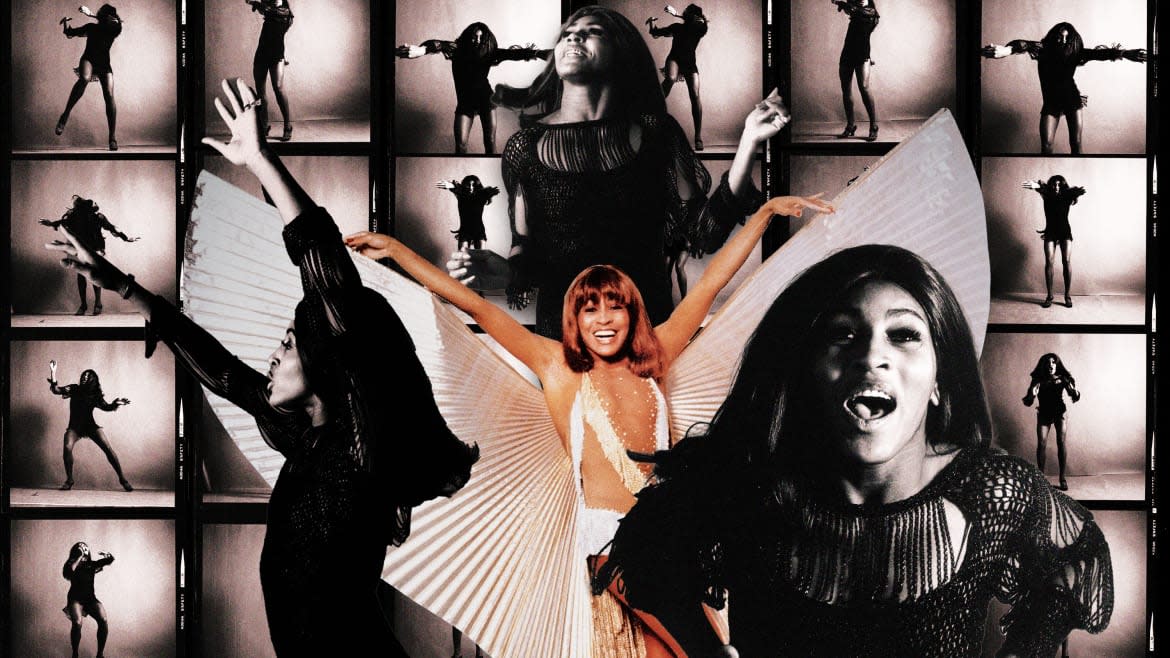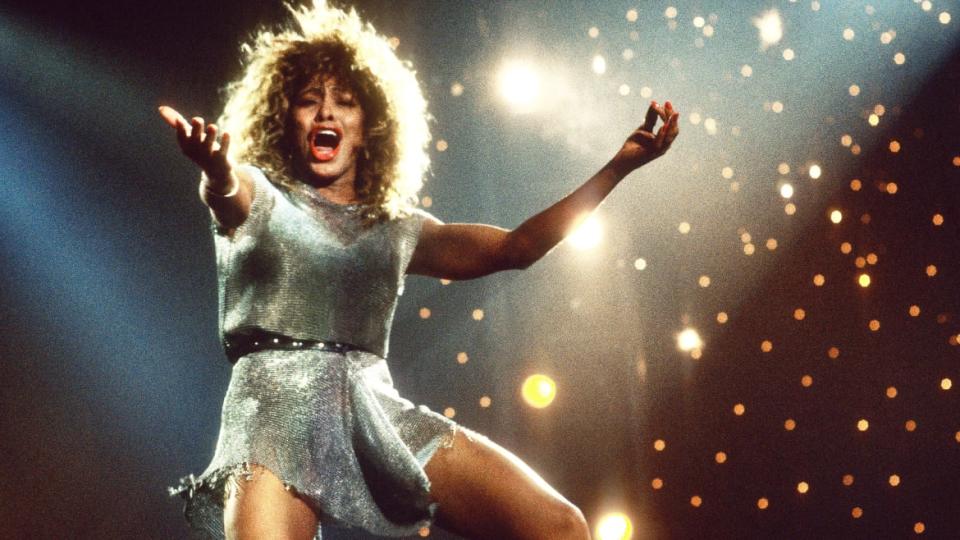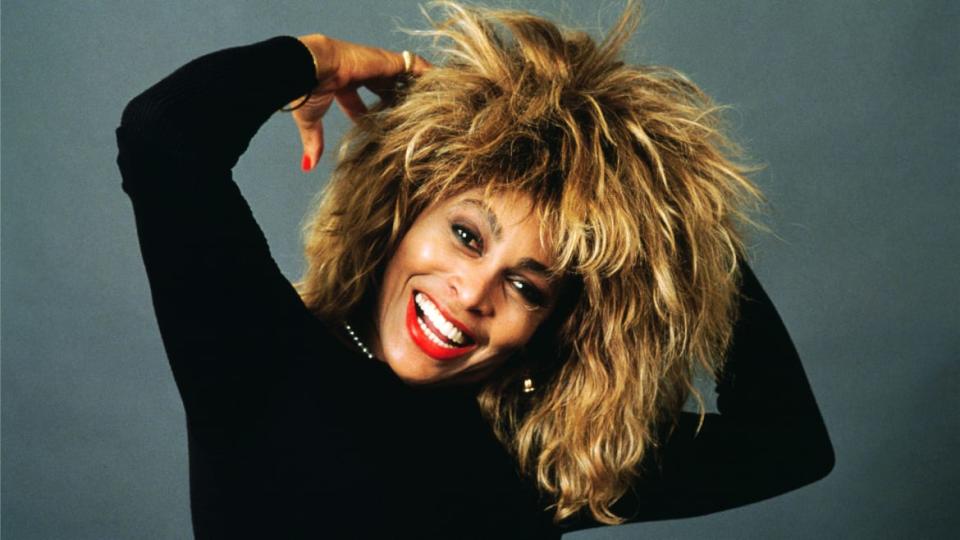What Tina Turner Taught Black Women About Resilience

- Oops!Something went wrong.Please try again later.
- Oops!Something went wrong.Please try again later.
- Oops!Something went wrong.Please try again later.
Growing up, I was taught not to worship celebrities, but to celebrate those with genuine talent, especially those who used their talent to uplift and inspire others. So while many of my friends were free to deify the Madonnas of the world, I was being taught, even as a child, that Harry Belafonte was much more than a handsome man who sang “The Banana Boat Song”; he was a trailblazer who made the path easier for Black creatives like myself who have followed. This is why losing Tina Turner so soon after Belafonte’s passing has felt like a double blow—because she represented an image of empowered female celebrity that has all but disappeared in the age of social media, and an image of Black womanhood that was as perfect as it was profound.
For starters, Turner’s journey from poverty to superstardom represented a world of possibilities for women from backgrounds like hers that few others did. Diana Ross and the Supremes exuded glamor, but if you weren’t near a big city like they were, becoming a Supreme seemed as likely as becoming an astronaut. Meanwhile, other Black female superstars of previous eras, from Lena Horne to Dorothy Dandridge, epitomized very narrow definitions of beauty—dainty and Eurocentric—that many Black women did not fit.
Tina Turner Never Pretended Her Story Had a Happy Ending
Then along came Tina Turner. A Black woman who grew up in the South picking cotton—just like my mom—she allowed other Black women with limited prospects and possibilities to dream, and dream they did. Something I’ve learned about privilege is this: one of its greatest advantages is that it gives you the ability to see dreams as potential realities in a way rarely imaginable for those who are not privileged. That was Turner’s great gift to so many women. That’s not the only one.

At a time when there is endless debate about the role of celebrities in society (should they stay out of politics and off of Twitter? Should they be considered role models?), Turner truly represented celebrity at its best. She wasn’t just entertaining and glamorous, but became one of the most significant Black women to ever walk (or shimmy) across this planet due to her ability to subvert racial stereotypes. Black women have long been stereotyped as angry, aggressive, and overly sexual. And while a typical Turner performance could certainly be deemed aggressive and sexy, here’s the thing: She took the stereotypes used to demean us and made them her own, reminding us that no matter what society tells us, there is a time and a place for righteous anger and for being sexy. In a world where an increasing number of female celebrities seem to think flaunting their nipples or wearing see-through dresses on a red carpet epitomize sexiness and feminism, she proved that when you’ve got confidence, talent, and class, showing a little leg can be the sexiest thing ever.
We Should Have Never Been So Comfortable Mocking Tina Turner’s Abuse
Turner was the rare celebrity who, refreshingly, valued their peace and privacy. Today, a celebrity gets stung by a bee and we get a blow-by-blow of their ER visit on Instagram. Yet in the last few years of Turner’s life, even as her health declined, there was no oversharing on social media. That’s not to say she lived anything less than a fully authentic life; in fact, her candor about the abuse she endured at the hands of her former mentor and husband, Ike Turner, is one of her most enduring and impactful contributions. Domestic violence was long something that occurred in the shadows and was rarely discussed, particularly among successful people. For Black women, in particular, suffering and surviving all types of indignities and pain have long been seen as part of our strength or our alleged “superpowers.” In fact, perhaps the most damaging stereotype of all is not that we’re angry or easy, but that we are so tough, we’re indestructible. (Studies have long shown racial disparities in health care which stem in part from the bizarre notion that Black people have a higher threshold for pain than other races.)
It’s as though the stereotype of the strong Black woman has existed as some sort of never-ending challenge to the world, as in, “Throw everything you can at a Black woman and watch her keep going.” But just because we can keep going doesn’t mean it doesn’t hurt, or that there aren’t scars left—physically, mentally, and emotionally—from doing so. Turner, however, bared her scars before the world in an effort to help other survivors know that they could not only survive, but thrive, like she did.

Turner didn’t just thrive; she proved you could heal and soar without wallowing in the destruction of others. One of the unique challenges of Black womanhood is living in a world in which many of the men in your life will be hurt daily by the inequity into which they were born. Some of those men will then turn their anger onto those closest to them, which so often are the women in their lives. This means that while Black people may feel more empowered today to speak out about racial violence, speaking openly about intra-community violence, particularly familial violence, remains hard and can feel akin to betrayal. Yet Turner spoke her truth about the horrific abuse she suffered at the hands of her ex-husband, while refusing to let that be the defining story of her life, or even his. She didn’t make it her mission to destroy him once she was fully free and back on top. She did make it her goal to serve as a guiding light to other women who might find themselves in similar situations.
As Turner grew older in an industry notoriously unforgiving of women who age, she even showed us how to do that better than anyone else. Staging an extraordinary comeback in her forties, and continuing to perform sold-out tours decades later, there were no sad attempts to stay “relevant” by trying to shock younger audiences with bizarre publicity stunts. In fact, she did the opposite. She gave everything she could when she was on the stage and retreated away from the spotlight when she was not.
She was simply the best. Today’s stars could learn a lot from her. We all can.
Get the Daily Beast's biggest scoops and scandals delivered right to your inbox. Sign up now.
Stay informed and gain unlimited access to the Daily Beast's unmatched reporting. Subscribe now.

